Independence Day is upon us and Israel’s innovation sector, which has become a beacon in the global tech arena over the years, is now in the spotlight for its technologies and solutions that can – and are being created to — fight against the novel coronavirus pandemic.
Throughout its 72 years, Israel has proven time and again that necessity is the mother of invention. From world-renowned agriculture technologies created in a country that is 60 percent desert; to dazzling defense and security technologies developed out of an existential need to survive a hostile neighborhood; to widescale autonomous vehicle expertise advanced in a country without even one car manufacturing plant; it was clear that Israeli entrepreneurs would enlist in the battle against COVID-19.
“We are innovating for the global community,” Dov Moran, a serial entrepreneur and managing partner at Grove Ventures, tells NoCamels. “No entrepreneur in technology would ever say ‘this’ is only for Israel. We are always looking for what can be done and to continue to do something despite difficulties. It’s not that the rest of the world doesn’t share this philosophy, but we seem to have it in a more intense way. It’s not about being smarter than others. It’s a mentality of searching, looking, trying, taking risks, thinking big, being bold – Israeli chutzpah.”
Israeli innovation is about finding solutions for present-day challenges but also for future ones. It’s about adapting technologies swiftly and creatively for new solutions.
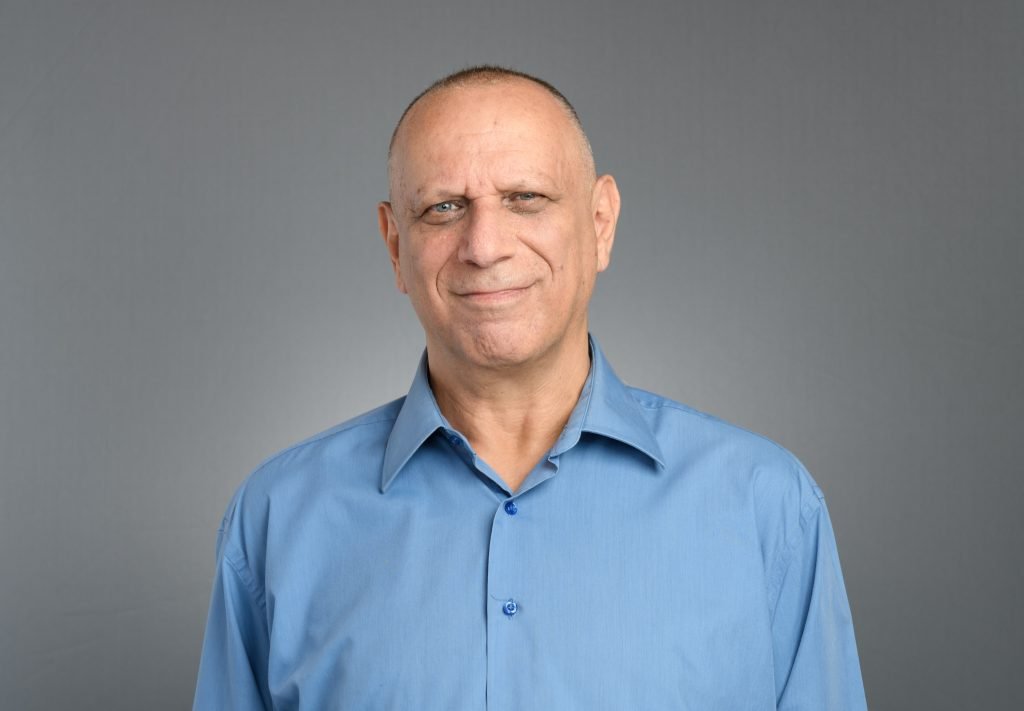
“During this coronavirus outbreak, you can see companies taking one technology and tweaking it for another purpose,” Hagai Balshai, CEO of RoboTiCan, tells NoCamels.
Balshai’s team of autonomous robotic mobile systems’ experts in the southern town of Omer rejigged their company’s existing KOMODO robot, which was initially designed for security and patrol services, to speedily develop the NurseeBot robot for the Covid-19 unit at Soroka Medical Center in Beersheva. The robot offers a non-contact communication method for doctors to interact with coronavirus patients.
“The ability to quickly adapt [technologies for new purposes] is ingrained in the Israeli mindset, you don’t always need to invent something new but rather the creativity can be found in the connections of things we didn’t think connected,” says Balshai, noting that upon completion of the pilot program with Soroka, the plan is to export NurseeBot to hospitals around the world.
The coronavirus has shown that it does not honor borders and has brought chaos to the world in every sector. But with the chaos, it is propelling Israeli entrepreneurs to pivot and add to their technologies to find solutions.
BeyondMinds, a Tel Aviv-based artificial intelligence company that bridges the gap between academic research and the mass adoption of enterprise-scale AI applications with made-to-measure software, works together with the world’s largest companies.
“When COVID-19 started, we knew that we had super strong AI abilities and we knew we could develop solutions in a short time,” Dr. Roey Mechrez, CTO at BeyondMinds, tells NoCamels.
Having already collaborated with Sheba Medical Center near Tel Aviv on a different project, the BeyondMinds team called them up with a new idea that would prevent Israeli doctors from dealing with Italy’s awful predicament of having to choose which coronavirus patients to save.
“We told them that we can help with prioritizing patient care,” says Mechrez, explaining that their AI system can predict whether to hospitalize or discharge a patient. “In our day to day lives, the assumption is the hospital will give the best care to the patient. In a war zone – and if coronavirus gets bad enough it will be like a semi-war zone — they need to do it immediately and optimize care. There are many decisions involved. We can help predict if a patient is going to have minor symptoms, will need ventilation, or is at a high risk of dying.”
Healthcare systems in the UK and Japan have already expressed interest in the BeyondMinds data platform.
The country’s defense establishment also switched gears from defense to offense in battle with COVID-19. Israel Aerospace Industries (IAI) has partnered up with local startups and is applying its extraordinary tech capabilities to numerous COVID-19 ventures to help develop ventilator solutions, disinfection methods, patient monitoring, diagnostic tools, protective gear for healthcare professionals, and AI to project coronavirus spread.
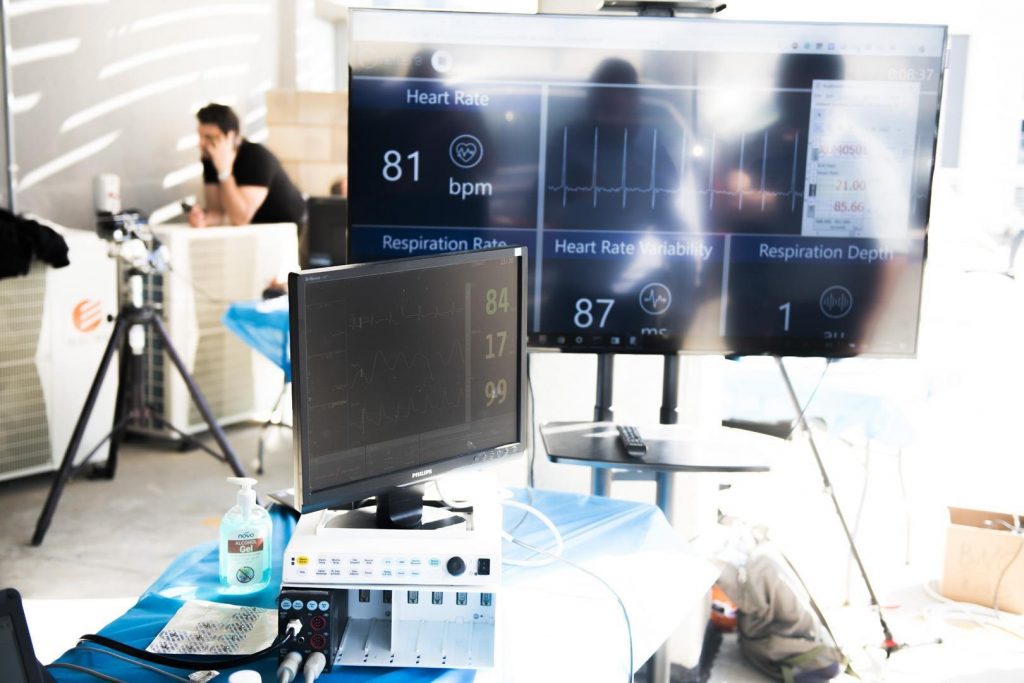
IAI is using its production facility to mass-produce Inovytec’s Ventway Sparrow ventilators.
It is also developing a system to rapidly disinfect rooms using UVC lights, which can be used to decontaminate hospital rooms or the interior of airplanes from virus traces.
“When we complete these developments, IAI will share them with our numerous partners across the globe so we can join forces in overcoming the pandemic,” reads the IAI website.
Especially now, local innovators are leveraging their know-how with partners in Israel and across the globe to overcome this pandemic.
Essence Group, a leading provider of IoT-based advanced telecare solutions for seniors, is collaborating with strategic partner FocusCura in the Netherlands to install Israeli-made technology in Corona-Hotels to help stem the spread of the virus by allowing medical staff to provide care remotely. The Herzliya-based company is also joining forces with Australian senior-care facilities.
“ICU beds are the key commodity in the fight against COVID-19. The Corona-Hotels make a huge difference in taking the pressure off hospitals, which in turn is helping save lives. By offering remote monitoring methods, our technology keeps people safe and enables patients to get the care they need outside of ICU. Technology has an essential role to play in the fight against COVID-19, and I am proud our technology can be a part of that,” said Dr. Haim Amir, CEO of Essence Group.
Collaboration Nation
Undeniably, the Covid-19 crisis is reinforcing Israel’s reputation as a “Collaboration Nation.”
Sign up for our free weekly newsletter
SubscribeThis is “a new age of collaboration, a new age of what we call innovation affairs of working on a global basis, on sharing the knowledge and experience of Israel as an innovation nation,” Chemi Peres, a prominent figure in Israel’s tech ecosystem and chairman of the Peres Center for Peace and Innovation, told NoCamels last month.
“Independence is not enough now. It is inter-dependence now that Israel is going to thrive with,” Howard Cooper, founding CEO of edtech startup MagniLearn, tells NoCamels. “We need to help unlock this potential of interaction and joint action, especially in light of coronavirus, we’re in it all together and we need to get out of it all together. We need to combine our different abilities and angles to lick this and other contagions and challenges the world will have to face together.”
MagniLearn represents solution offerings for after Covid-19.

“Education will never go back to the way it was before. This is a huge inflection for the sector and the companies and schools that understand this are going to go forward,” says Cooper about his firm’s online personalized educational platform that teaches English online using natural language processing and computer intelligence to adapt instruction to each student according to ability. MagniLearn is already working in Israel, China and Brazil, and has now been contacted by Vietnam to introduce its platform in schools there.
While Israeli innovators are always looking out to partner up in the global markets, international investors and enterprises are also looking in for great technologies.
In the first week of April, Start-Up Nation Central (SNC) and HealthIL, a non-profit organization that works with the Israeli digital health ecosystem, launched CoronaTech Israel, a site offering information about technological developments from Israel as well as opportunities for cross-border collaborations.
There are also over 500 multinationals in Israel, millions of dollars being invested by global companies in Israeli startups, and countless ongoing collaborations.
“Many of the world leaders in the tech sector appreciate the Israeli uniqueness and Israeli technology, know-how, and capabilities. This leads to strong cooperation,” says Moran, best known for his role as guy-who-invented-the-USB-memory-stick (disk on key). “Companies from places like Japan, Switzerland, France, and the US, among others, see Israel as an amazing place to invest and they want to be involved in what is going on in Israel’s tech scene. The level of interest, even in these days of the coronavirus pandemic, has not decreased.”
Indeed, local innovators are attracting international attention for tech breakthroughs, groundbreaking research, audacious clinical trials and new funding, investments, and collaborations.
Recent headlines include the breakthrough research by scientists at Tel Aviv University for a new vaccine against COVID-19; a $12 million investment round led by OurCrowd for MigVax, another research team developing an oral COVID-19 sub-unit vaccine; a clinical trial at Haifa’s Rambam Hospital by Vocalis Health, which has launched a voice-based test study to triage, screen and monitor for COVID-19 symptoms and find a unique vocal coronavirus ‘fingerprint’; UVeye’s ability to use sensor technology to detect whether drivers and passengers in a vehicle have a fever and Diagnostic Robotics use of artificial intelligence to map and predict the focal points of the virus’s spread.

“It’s not just thinking out-of-the-box that makes Israeli innovation what it is. It is a mixture of features including thinking out-of-the-box, being agile, helping the world, not being afraid of failure. These are things well-embedded in our DNA and culture,” says Moran.
That’s not to say all is well in the innovation sector in Israel. Like elsewhere, the local tech scene is affected by the coronavirus. Companies are laying off workers, some are closing, and early financing rounds were down 17-percent from quarterly averages of 2019, according to an April 2020 IVC and ZAG – S&W (Zysman, Aharoni, Gayer & Co.) report.
“Everybody is going to see less money for any portfolio this quarter and perhaps in following quarters as well. We are all connected. We’re going to see difficulties to sell new products, to bring new technologies, to get companies to be acquired,” Moran explains, noting that as a long-time entrepreneur he has experienced challenging times as well, which “should be regarded as a part of every entrepreneur’s journey, from which they should be able to learn and grow.”
And still, Israel’s 72-year history shows that overcoming “disasters” is what this country does best.
While the coronavirus pandemic will lead to a decrease in venture capital activity, with adjustments to expenses and growth forecast, the IVC and ZAG report suggests that Israeli high-tech companies will nonetheless continue to raise capital and even establish new companies.
“We are confident that the Israeli high-tech industry will return to its glory; the only question is how fast,” Adv. Shmulik Zysman, founding partner of ZAG-S&W international law firm and head of the firm’s high-tech department, said in a statement.
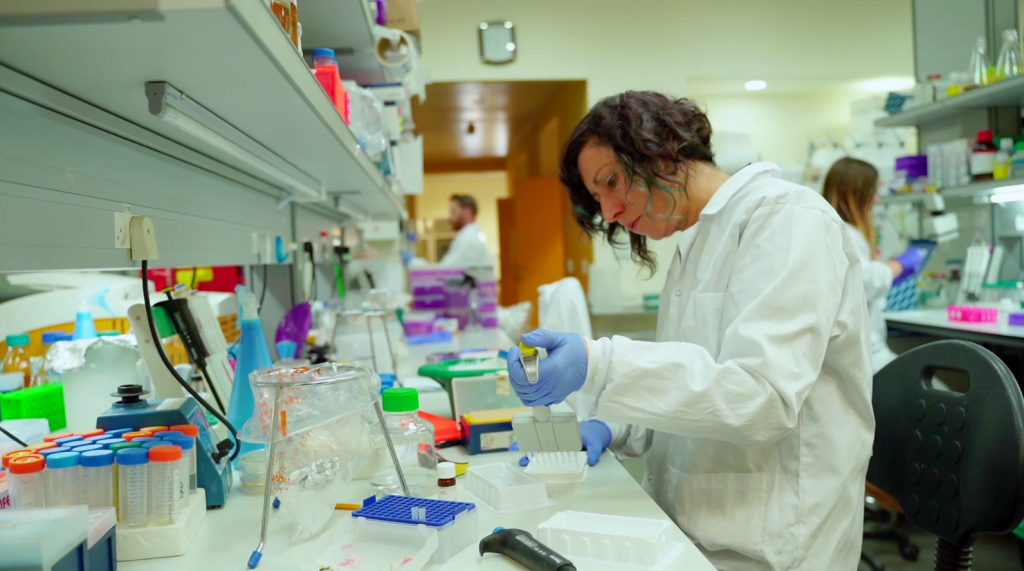
“The strength of Israeli high-tech will be tested in 2020… Even though many companies will suffer, IVC believes that overall, the Israeli tech industry will emerge strengthened from this challenge. In the long run, the crisis will create an opportunity for international corporations, Corporate VCs and VC funds to increase their involvement in Israeli investments and acquisitions,” Guy Holtzman, CEO of IVC Research Center, said in a press statement.
Moran, who spoke to NoCamels in a Zoom interview on Holocaust Remembrance Day made sure to note the importance of the day as an example of overcoming even the most tragic circumstances.
“I won’t say Israel will benefit from the coronavirus but I think we will be among the first to adapt, to understand what should be done, to understand what is going to be important in the world, where we need to focus our efforts, innovations, technology developments,” he tells NoCamels. “I do believe Israel will get out of this disaster even stronger.”
Viva Sarah Press is a journalist and speaker. She writes and talks about the creativity and innovation taking place in Israel and beyond. www.vivaspress.com
Related posts

Editors’ & Readers’ Choice: 10 Favorite NoCamels Articles

Forward Facing: What Does The Future Hold For Israeli High-Tech?

Impact Innovation: Israeli Startups That Could Shape Our Future


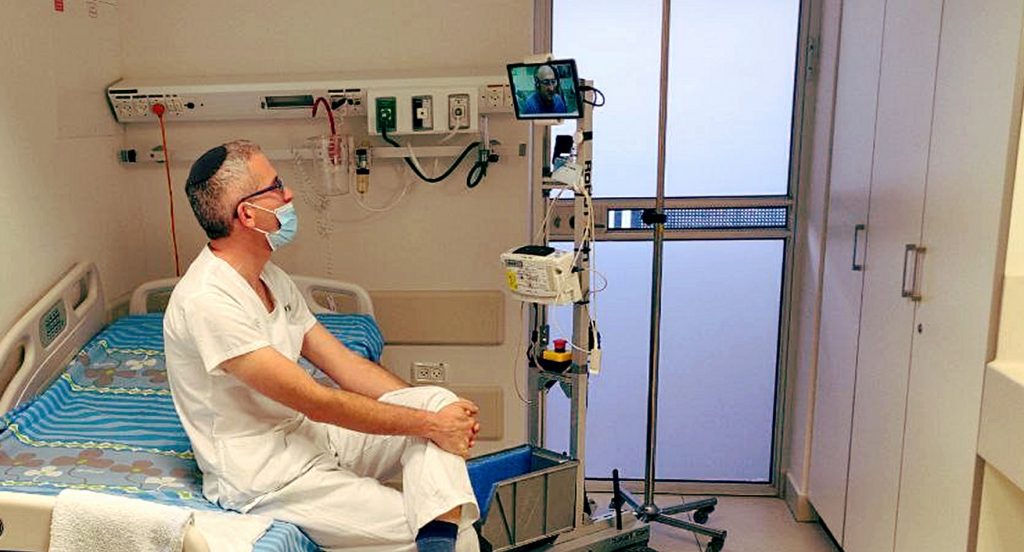
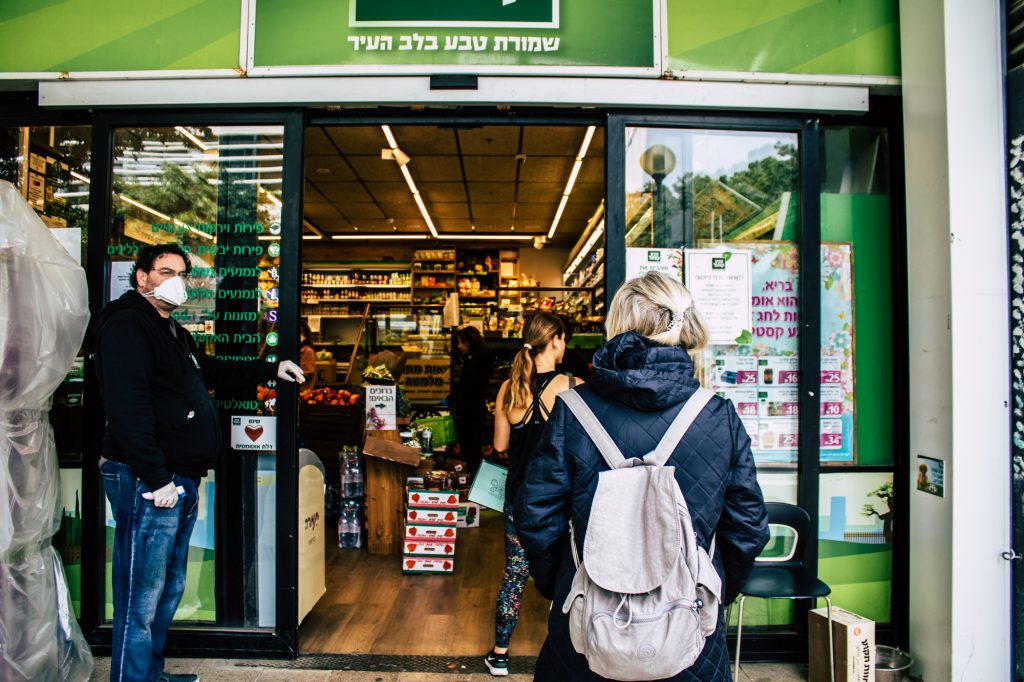

Facebook comments